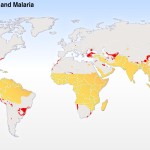- DETERRENCE: China’s military and the U.S.-Japan Alliance in 2030: A strategic net assessment
- DPRK: Immortal feats for DPRK-China friendship
- ENERGY SECURITY: The new Prometheus (Book Review of Comeback, by Charles R. Morris)
- GOVERNANCE AND CIVIL SOCIETY: 60,000 protest Japan’s plan to restart nuclear power plants
- CLIMATE CHANGE ADAPTATION: Climate change and mosquito-borne diseases in China: A review
- CLIMATE CHANGE AND SECURITY: The Sumatran rainforest will mostly disappear within 20 years
 DETERRENCE: China’s military and the U.S.-Japan Alliance in 2030: A strategic net assessment, Michael Swaine et al, Carnegie Endowment for International Peace (3 May 2013) [PDF, 4MB]
DETERRENCE: China’s military and the U.S.-Japan Alliance in 2030: A strategic net assessment, Michael Swaine et al, Carnegie Endowment for International Peace (3 May 2013) [PDF, 4MB]
No military has faced a comprehensive anti-access, area denial set of capabilities that integrates cyber and kinetic capabilities. Nor has anyone inventoried “counter-A2/AD” forces in the US and allied military due to service and allied reluctance to share weapons system data.
- U.S.-made Chinese military power report as tasteless ‘chicken ribs,’ Zhao Xiaozhuo, Zhao Weibin, Academy of Military Sciences, People’s Liberation Army, China Military Online (9 May 2013)
- Pentagon’s China guru David Helvey: Friction is ‘inevitable’ but mil-mil relations are ‘as good as it has been,’ Kevin Baron, Foreign Policy (8 May 2013)
- China’s growing military might: top 4 concerns for the Pentagon, Anna Mulrine, Christian Science Monitor (9 May 2013)
DPRK: Immortal feats for DPRK-China friendship, Rodong Sinmun (3 June 2013)
On 3 June, North Korea’s official press communicated to China, South Korea and the region through an infrequent editorial and an article on the 15 June declaration which should be seen as a point of departure for future discussions. Some Chinese perceive North Korea’s articles after Kim Jong-un’s Special Envoy returned from visiting China are not consistent with Chinese perceptions of North Korean promises to denuclearize.
- Rodong Sinmun calls for remaining true to June 15 joint declaration, Korean Central News Agency (2 June 2013)
- South-North Joint Declaration, United States Institute of Peace Collection (15 June 2000) [PDF, 34.9KB]
- Update on Yongbyon: restart of plutonium reactor nears completion; work continues on the experimental light water reactor, 38 North with analysis by Jeffrey Lewis and Nick Hansen (3 June 2013)
ENERGY SECURITY: The new Prometheus (Book Review of Comeback, by Charles R. Morris), Daniel Yergin, Barrons (31 May 2013)
For Daniel Yergin (and Charles Morris), happy days are here again; shale fuels will power reindustrialization of America. Jim Hansen is worried about the prospects of more CO2 in the atmosphere. In the meantime everything from water shortages, hunger, and disease in the Marshall Islands to crime in New York streets to large fire in the powerhouse north of Los Angeles is blamed on climate change today, not just the tornadoes and storms in the US Midwest in the last two weeks.
- Ex-NASA scientist says reindustrializing with fossil fuels makes no sense, Euractiv.com (15 May 2013)
- Pacific islands’ deadly threat from climate change, Phillip Muller (Foreign Minister of the Marshall Islands), Washington Post (30 May 2013)
- Climate change concern: Will longer heat waves lead to bigger crime waves? Pix11 (4 June 2013)
- Powerhouse wildfire north of L.A. heralds a much longer fire season, Daniel B. Wood, Christian Science Monitor (3 June 2013)
GOVERNANCE AND CIVIL SOCIETY: 60,000 protest Japan’s plan to restart nuclear power plants, UPI (2 June 2013)
Up to 60,000 protestors rallied in Tokyo against plans to restart nuclear power, gathering over 8 million signatures. Warnings on the risks of nuclear energy were removed from the 2013 white paper on environmental issues while a UN report found the Fukushima meltdown unlikely to affect the general public’s health. The ROK has halted operations at 2 reactors after discovering components with fabricated safety certificates were used.
- Environmental government white paper removes risks of nuclear power, Tetsu Kobayashi, Asahi Shimbun (4 June 2013)
- Japan’s nuclear disaster ‘unlikely’ to have future health effects, Newsroom America (3 June 2013)
- South Korea shuts 2 reactors over faked certificates, Choe Sang-hun, New York Times (28 May 2013)
 CLIMATE CHANGE ADAPTATION: Climate change and mosquito-borne diseases in China: A review, Li Bai, Lindsay Carol Morton and Qiyong Liu, open access, Globalization and Health , vol. 9, No. 10 (2013) [419 KB, PDF]
CLIMATE CHANGE ADAPTATION: Climate change and mosquito-borne diseases in China: A review, Li Bai, Lindsay Carol Morton and Qiyong Liu, open access, Globalization and Health , vol. 9, No. 10 (2013) [419 KB, PDF]
In recent years, the impact of climate change on the transmission of mosquito-borne diseases has been studied in China. However, the quantitative relationship between meteorological variables and the spatial and temporal distributions of these infectious diseases is still not clear. The studies in this area are mostly inconsistent, which may be due to methodological limitations, unavailability of relevant data and many uncertainties about the range and magnitude of influences of climate change.
- Climate change and human health: present and future risks, Anthony J McMichael, Rosalie E Woodruff, Simon Hales, The Lancet, vol. 367, no. 9513 (2006) [subscription required]
- Climate change and mosquito-borne disease, Paul Reiter, Environmental Health Perspectives, vol. 109 (2001) [1.78 MB, PDF]
CLIMATE CHANGE AND SECURITY: The Sumatran rainforest will mostly disappear within 20 years, John Vidal, The Observer, Guardian (26 May 2013)
This is the fastest, most comprehensive transformation of an entire landscape that has ever taken place anywhere. Indonesia’s deforestation has been accompanied by rising violence. In 2012 more than 600 major land conflicts were recorded in palm plantations. Many turned violent as communities that had lost their forest fought multinational companies and security forces. More than 5,000 human rights abuses were recorded, with 22 deaths and hundreds of injuries.
- Indonesia is seeing a new corporate colonialism, John Vidal, The Observer, Guardian (26 May 2013)
- Indonesia’s indigenous peoples wins court rule regarding land rights but skepticism needs to remain, lastplacesonearth (22 May 2013)
- Will California fall into the REDD trap? Manuela Picq, Al Jazeera (7 May 2013)
The Nautilus Peace and Security Weekly Report presents articles and full length reports each week in six categories: Austral security, nuclear deterrence, energy security, climate change and security, the DPRK, climate change adaptation and governance and civil society. Our team of contributors carefully select items that highlight the links between these themes and the three regions in which our offices are found—North America, Northeast Asia, and the Austral-Asia region.
Subscribe to NAPSNet to receive free weekly email reports
Editor
Contributors
- Deterrence: Peter Hayes
- Governance and Civil Society: Dyana Mardon
- Climate Change Adaptation: Saleem Janjua
- DPRK: Roger Cavazos
- Energy Security: Nikhil Desai
- Climate Change and Security: Richard Tanter

